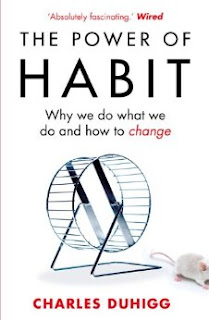AUTHOR: CHARLES DUHIGG
ORIGINAL LANGUAGE: ENGLISH
A book that overwhelmingly talks about the power of a habit.
There are numerous examples of people who have a habit and what did they accomplish with that habit. Also, there are stories of people who have a less valuable life because of their habits.
Habit is defined in English as below
Habit(n): an acquired behavior pattern regularly followed until it has become almost involuntary
Now with that definition of habit, it's a pattern. Habits are consistent as consistent as doing brush daily. Our life is actually consumer by habits for 70-80% what we do for the remaining part is actually a luxury. So if we have good habits, then we shall be successful and we have bad habits we shall be a failure in life.
This book did not tell about how to correct bad habits in detail and almost followed a similar pattern for each of habit that was explained. Be it drinking a coffee, eating a choco chip or brushing teeth. Also, organizations mentioned in the book are told to have benefitted with habits. The examples given in the book depict reality and I appreciate the author Charles Duhigg for his research work.
After reading through the first two chapters I got a hang of the context of the book and started skimming through the pages. I did not find any great value add I must say by the end. Although,
in Appendix I found something of huge value, I thought the rest of 250 odd pages were filled with stories that were reasoning more on habit formation and sustenance.
The book though gives a scientific explanation, it evolves from stories and studies. It's like trying to sell a thought process providing examples. That's one of the main reasons, which did not make me involve as a reader. I cannot buy or read through books whose intent is to sell a thought. Those are preachy books and this book I felt is preachy too. I am not sure if I can call it self-help too coz I could not get any great help from the book.
Yet, I got to know an understanding of habit and the cue-routine-reward loop.
Also, the framework for reshaping a habit was well put.
Identify the Routine
Experiment with Rewards
Isolate the Cue
Have a Plan
Though for me it was an average read, I got some insights and am thankful for that.
The best paragraph for me in the book was actually a quote of William James.
"All our life, so far as it has definite form, is but a mass of habits - practical, emotional, and intellectual - systematically organized for our weal or woe, and bearing us irresistibly toward our destiny, whatever the latter may be"
ORIGINAL LANGUAGE: ENGLISH
A book that overwhelmingly talks about the power of a habit.
There are numerous examples of people who have a habit and what did they accomplish with that habit. Also, there are stories of people who have a less valuable life because of their habits.
Habit is defined in English as below
Habit(n): an acquired behavior pattern regularly followed until it has become almost involuntary
Now with that definition of habit, it's a pattern. Habits are consistent as consistent as doing brush daily. Our life is actually consumer by habits for 70-80% what we do for the remaining part is actually a luxury. So if we have good habits, then we shall be successful and we have bad habits we shall be a failure in life.
This book did not tell about how to correct bad habits in detail and almost followed a similar pattern for each of habit that was explained. Be it drinking a coffee, eating a choco chip or brushing teeth. Also, organizations mentioned in the book are told to have benefitted with habits. The examples given in the book depict reality and I appreciate the author Charles Duhigg for his research work.
After reading through the first two chapters I got a hang of the context of the book and started skimming through the pages. I did not find any great value add I must say by the end. Although,
in Appendix I found something of huge value, I thought the rest of 250 odd pages were filled with stories that were reasoning more on habit formation and sustenance.
The book though gives a scientific explanation, it evolves from stories and studies. It's like trying to sell a thought process providing examples. That's one of the main reasons, which did not make me involve as a reader. I cannot buy or read through books whose intent is to sell a thought. Those are preachy books and this book I felt is preachy too. I am not sure if I can call it self-help too coz I could not get any great help from the book.
Yet, I got to know an understanding of habit and the cue-routine-reward loop.
Also, the framework for reshaping a habit was well put.
Identify the Routine
Experiment with Rewards
Isolate the Cue
Have a Plan
Though for me it was an average read, I got some insights and am thankful for that.
The best paragraph for me in the book was actually a quote of William James.
"All our life, so far as it has definite form, is but a mass of habits - practical, emotional, and intellectual - systematically organized for our weal or woe, and bearing us irresistibly toward our destiny, whatever the latter may be"


No comments:
Post a Comment